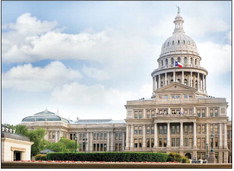Gov. Greg Abbott just before the midnight deadline Sunday vetoed a bill on THC products and said he would call a special legislative session to regulate items containing the substance, the Austin American-Statesman reported.
The veto angered the bill’s chief champion, Lt. Gov. Dan Patrick.
The governor’s decision was being closely watched by both supporters of the bill, including law enforcement, and opponents, the latter of which included those in the hemp industry, libertarian conservatives and veterans’ groups.
The veto came about 30 minutes before the midnight deadline.
“At worst, Senate Bill 3 would be permanently invalidated by the courts,” Abbott wrote. “At best, its implementation would be delayed for years as the case winds its way through the legal system. We can do better.”
The 30-day special session on how or whether to regulate products containing THC will begin July 21.
Patrick quickly denounced the veto.
“His late-night veto, on an issue supported by 105 of 108 Republicans in the Legislature, strongly backed by law enforcement, many in the medical and education communities, and the families who have seen their loved ones’ lives destroyed by these very dangerous drugs, leaves them feeling abandoned,” he wrote on X.
Both Patrick and Abbott are also Republicans.
If SB3 had gone into effect, tens of thousands of businesses selling hemp-infused wares would have faced closure.
Abbott late Sunday also signed bills approving the state budget and an overhaul of the Texas lottery.
GOVERNOR SIGNS $10B WATER PLAN; NOW VOTERS TO DECIDE
Gov. Greg Abbott signed two bills into law last week that will launch a $20 billion investment in the state’s water infrastructure if voters approve the proposed constitutional amendment in November.
If voters pass the measure, $1 billion in state tax revenues will be set aside for water projects each year, the Houston Chronicle reported.
“This session, Texas confronted a crisis,” Abbott said when signing the bill in Lubbock. “Compounding a problem of inadequate sources of water, we lose about 88 billion gallons of water a year because of broken, busted and aged pipes.”
The new funds would be spent on repairing those leaks in aging water systems and on finding new sources of water.
State Sen. Charles Perry, R-Lubbock, considered the Legislature’s chief water expert, shepherded the legislation through the Senate. He said passage of the proposed amendment would change how the state approaches its water needs, which are expanding rapidly because of growth, aging infrastructure and increased industrial demand.
“It’s going to be a little bit of a cultural shift from the way we do water in Texas,” Perry said. “We’re moving from a siloed, city-by-city conversation to where we’re going to have more oversight and more of a coordinated effort.”
STATE CURBS SPENDING ON BORDER AS CROSSINGS DROP
Illegal border crossings have dropped dramatically since the summer of 2024, when then-President Biden widely restricted asylum, and it has continued to slow under the Trump administration. The Texas Tribune reported Border Patrol agents in May arrested 12,452 people for illegal crossings of the U.S.-Mexico border, compared to 170,000 people arrested the previous May.
The Legislature has already allocated $3.4 billion on border security for the next two years. The money is expected to be shifted largely to assisting the federal government with deportation efforts. Lawmakers also slashed funding for the state’s largely unbuilt border wall, ceding border control back to the federal government.
The state is seeking reimbursement for $11 billion spent under Operation Lone Star, the state’s effort to stop illegal migration along the Rio Grande. The massive spending bill passed in May by the U.S. House allocates $12 billion for Texas and other states for past border security spending. However, the Senate has yet to act on that measure.
STATE AUDIT FINDS MAJOR LAPSES IN JAIL SYSTEMS
A recent audit of the agency in charge of overseeing the state’s county jails faulted the Texas Commission on Jail Standards for failing to consistently investigate prisoner complaints, maintain accurate records or complete legally required inspections, the Texas Standard reported.
The audit, which covered the period from October 2022 to December 2024, identified some of the failures as “high risk.”
“These weaknesses increase the risk that the Commission will not identify a jail in violation of minimum standards, which could affect the safety and well-being of inmates,” auditors wrote.
In a written response to the audit, the TCJS said it agreed with the findings and plans to implement fixes by Aug. 1.
“TCJS will improve its processes and uphold its commitment to effective oversight and accountability,” the agency wrote.
$10 BILLION IN GRANTS FOR ELECTION SECURITY ANNOUNCED
The deadline is fast approaching for counties to apply for grants to strengthen election security, Texas Secretary of State Jane Nelson announced. The funding is coming through the federal Help America Vote Act.
Grant amounts will be based on the number of registered voters in each county, which must supply a 20% grant match. The deadline to apply is June 30; awards will be made by Aug. 1.
“These grants will go a long way toward helping counties better secure their elections, and I’m pleased to partner with counties to promote election security throughout Texas,” Nelson said.
Funding priorities include:
• Compliance with paper audit-trail requirements
• Replacement of decertified electronic pollbooks
• Video surveillance systems to comply with ballot security measures
• Protection of election equipment and supplies
• IT services and upgrades
LATEST STAAR RESULTS SHOW MIXED RESULTS
Third through eighth graders taking the state’s assessment exams showed mixed results, according to results from the Texas Education Agency. The Tribune reported the elementary students taking the State of Texas Assessments of Academic Readiness exam made the biggest gains in reading, especially among third graders.
“These results are encouraging and reflect the impact of the strategic supports we’ve implemented in recent years,” said Texas Education Agency Commissioner Mike Morath. “We are seeing meaningful signs of academic recovery and progress.”
Performance on the math portion also improved but is still below pre-pandemic levels, with 43% of students meeting or mastering those requirements, up two percentage points from last year. That is still down from the 50% who met those levels in 2019, before the pandemic.
Parents can access their child’s test results at texasassessment.gov but must have the unique access code provided by the child’s school.
Borders is a veteran award-winning Texas journalist. He published a number of community newspapers in Texas during a 30-year span, including in Longview, Fort Stockton, Nacogdoches, Lufkin, and Cedar Park. Email: [email protected].

.png)






